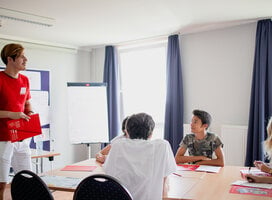German Language Schools in Austria
Those who learn German in Austria will quickly discover that there are two types of German used in Austria: Austrian German and Austro-Bavarian German. Austrian German is not usually spoken by Austrians, but merely used in official documents or historical texts. Most Austrians speak Austro-Bavarian German, which is what most people in southern Germany (Bavaria) speak.
The majority of the grammar is the same between Hochdeutsch (what most Germans speak) and Austro-Bavarian German, but the main difference is in the vocabulary. Most people who study German find that Austro-Bavarian German is among the most beautiful dialects of German, and even though it can be more challenging, it's well worth the time in learning it.
So what should you know before setting out to learn German in Austria? Stick with us to find language courses in Austria, and learn more about planning your trip abroad.
Like any country, there are pros and cons to studying German in Austria. Unless you had an Austrian German teacher, you will most likely not understand the Austrians for the first few weeks of your time abroad.
However, Austro-Bavarian German is easy to pick up once you're immersed in it, and if you really want to become fluent in German, studying Austro-Bavarian German is a great way to do that. Because it's more challenging to learn, most other German dialects will be easier to understand after studying in Austria.
University Courses
The university schedule in Austria is fairly similar to that in the U.S. The only exception is that their fall semester runs until early February and their spring semester runs until the end of June or early July. This is why most students who do a program where they matriculate directly into the Austrian university go during their spring semester, or why many language students choose to do a program that mirrors the U.S. academic schedule.
University classes are one of the best ways for German learners still in college to learn German because it's easy to make friends with locals and other international students. One of the perks of taking university classes is that you will also be eligible for any extracurricular and outside activities that other university students get, such as discounted tickets to museums and concerts.
Homestay Programs
Living in a homestay is absolutely the best way to learn German. Just by having daily conversations with your host family, you will learn more about German than by studying it for years. While homestay programs aren’t for everyone, anyone who has lived with a host family will agree that it's the fastest and easiest way to become fluent.
Not only will you learn more German, but you will also learn more about the Austrian culture. A homestay program is ideal for a German learner who is willing to step outside of his/her comfort zone to learn the maximum amount while abroad.
Language Study & Culture Immersion Combination Programs
This type of program is ideal for any German learner who wants to focus on learning the Austrian dialect and culture.These programs can include volunteering, interning, living in a homestay, and partaking in cultural excursions in addition to taking classes. If the purpose of your travels abroad is to become immersed in a different culture, definitely look into this type of program.
Highlights
- Check out the crowd: 8.5 million inhabitants, 99% of the population speak German.
- Did you know...? Austria is the home of the oldest restaurant and zoo in the world.
- School’s out, let’s have some fun: Get in touch with your graceful side and take a Viennese Waltz class or make your own Sound of Music tour.
- Wow others with an Idiom! “Es ist mir Wurst” literally translates to “it's sausage to me”, but means the equivalent of “I don’t care”.
Vienna, Austria
As the capital of Austria, there is nothing that Vienna doesn’t have. With over 1.7 million inhabitants from a myriad of different places, it's the ideal city for a language learner to study in. There are many different German learning options for you to choose from -- from universities, to private language courses, and innovative combinations in between.If you’re looking for a medium-size city with a rich history and culture, Vienna is for you.
Innsbruck, Austria
Innsbruck is the fifth largest city in Austria with 118,000 people and it's the capitol of the state of Tyrol. it's located in the heart of the Alps and has hosted the Winter Olympics twice. Because of its natural beauty, history, and attractions (such as the Swarovski headquarters), Innsbruck is a very popular tourist destination.
Despite this, it's easy for visitors to feel immersed in the Austrian culture and language because there isn't the same expat and international student population that exists in Vienna. Innsbruck is the ideal city for learning German in Austria if you want small city charm combined with world-class sport facilities and a welcoming atmosphere.
Salzburg, Austria
The fourth largest city in Austria, Salzburg is one of its biggest tourist destinations. As the home of Wolfgang Amadeus Mozart and the real von Trapp family, people from all over the world flood to this breathtakingly beautiful city. Surrounded by the Salzkammergut (or Lake District) and seated at the beginning of the Alps, Salzburg is the perfect combination of modern ambiance and traditional character.
Your options in Salzburg are slightly more limited than in Vienna, but there are still several language schools, universities, and programs to choose from, as well as plenty to do when not in class. If you want great academics combined with renowned architecture and natural beauty, look no further than Salzburg.
Qualifications
If you're only taking a short language course (less than 90 days), you can enter on a tourist visa. For anyone who wants to study longer than that, you'll have to apply for and receive a student visa (unless, of course, you're a lucky EU passport holder!)
In Austria, there are language programs for every age and ability, so don’t panic about not being able to find a program that lines up with your level.
Cultural Immersion
Most language courses incorporate social outings and activities in order to really give language learners a more holistic understanding of the language.
These activities can range from volunteering, to trips, to music and dance classes to intramural sports. One of the best ways to further your learning in Austria is to take an extracurricular class. Whether it’s Austrian cooking or Viennese Waltz lessons, hearing and speaking German outside of a traditional classroom setting will have you learning much faster than studying vocabulary and grammar.
Traveling is another great way to learn outside of a classroom. European traveling is comparably easy and inexpensive, and using the train system or discount airlines such as RyanAir can get you to almost anywhere you want for cheaper than you ever thought possible.
Financial Costs
Financially, Austria is a typical European country. It's easy enough to stick to a low budget, but it's also easy to blow your entire bank account if you’re not careful.
Most travelers end up spending between 80 - 160 euros per day while in Austria -- though staying long term in one place can help you reduce these costs by renting an apartment (rather than a hotel room), cooking for yourself more often, and often taking advantage of deals offered by your school.






